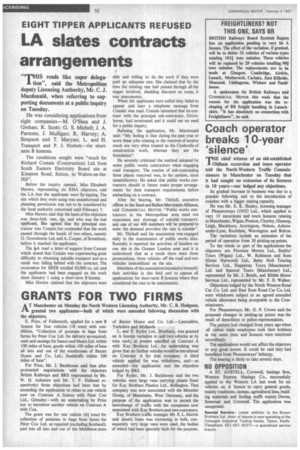LA slates contracts arrangements
Page 54

If you've noticed an error in this article please click here to report it so we can fix it.
HIS reads like super delega tion", said the Metropolitan deputy Licensing Authority, Mr. C. J. Macdonald, when referring to supporting documents at a public inquiry on Tuesday.
He was considering applications from eight companies—M. O'Shea and J. Grehan; R. Scott; G. S. Michell; J. A. Parsons; J. Mulligan; R. Harvey; A. Simpson and T. Maryan; L. and H.
Transport and P. J. Norkett—for shortterm B licences.
The conditions sought were "muck for Richard Costain (Construction) Ltd. from South Eastern Electricity Board site at Kimpton Road, Sutton, to Walton-on-theHill".
Before the inquiry opened, Miss Elizabeth Havers, representing six RHA objectors, told the LA that the applicants were fly-tipping. The site which they were using was unauthorized and planning permission was not to be considered by the local authority concerned until February 7.
Miss Havers said that the basis of the objection was three-fold: rate, tip, arid who was the real applicant: She agreed that the principal contractor was Costain but contended that the work passed through the hands of two others, namely G. Groveborne Ltd. and A. Cooper, of Streatham, before it reached the applicants.
The 11,A read a letter of support from Costain which stated that Costain was experiencing great difficulty in obtaining suitable transport and as a result was falling behind with the contract. The excavation for SEEB totalled 30,000 Cu. yd and the applicants had been engaged on the work since January 1 using a short-term B licente.
Miss Havers claimed that the objectors were able and willing to do the work if they were paid an adequate rate. She claimed that by the time the existing rate had passed through all the stages involved, shedding discount en route, it was uneconomic.
When the applicants were called they failed to appear and later a telephone message from Costain was read. Costain intimated that its contract with the principal sub-contractor, Groveborne, had terminated and it could see no need for a public inquiry.
Refusing the application, Mr. Macdonald said: "My feeling is that during the past year or more these jobs relating to the removal of surplus muck are very often treated as the Cinderella of construction work, whereas they are the foundation".
He severely criticized the method adopted by some public works contractors when engaging road transport. The routine of sub-contracting three places removed was, in his opinion, most unsatisfactory. He asked that public works contractors should in future make proper arrangements for their transport requirements before embarking on a contract.
After the hearing, Mr. Thirkell, executive officer to the Sand and Ballast Merchants Alliance, told COMMERCIAL MOTOR: "Public works contractors in the Metropolitan area need not experience any shortage of suitable transport: any one of our 400 members will be prepared to meet the demand provided the rate is suitable".
Mr. Thirkell said his association was engaged daily in the examination of public works sites. Recently it reported the activities of hauliers on one site in the Greater London area and it is. understood that as a result there were three prosecutions, three vehicles off the road and two vehicles immobilized on the site.
Members of the association intended to intensify their activities in this field and to oppose all applications for short-term B licences where they considered the rate to be uneconomic.
















































































































































































